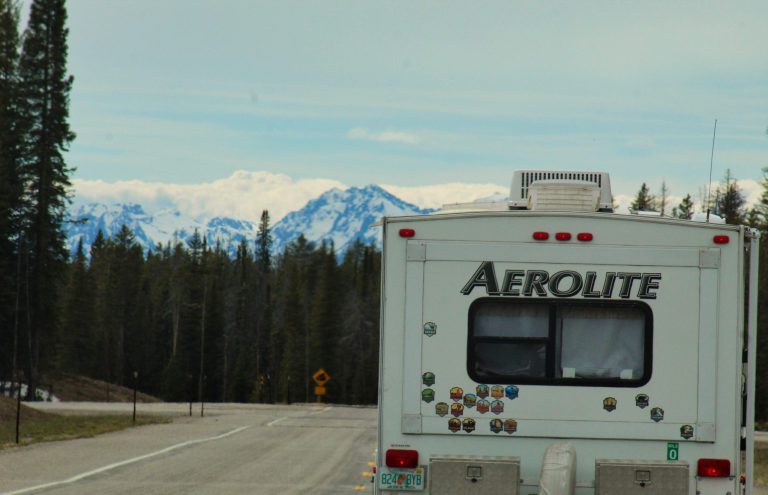
When you roll into your driveway at the end of your RV battery life after a long RV trip, it’s tempting. You need to get those batteries charged. You’re tired, and you certainly don’t want to go anywhere else right now to charge them. Can’t you just plug them into your dryer outlet and be done with it?
Can I Plug My RV Into My Dryer Outlet?
Your dryer outlet looks like it takes the same plug as your RV plug. Can you just interchange them and plug both things into the same outlets?
No. You can’t.
The plugs may look the same, but they handle different amounts of voltage. Plugging your RV into your dryer outlet will damage your batteries, could damage the electrical system in your house, and, in the worst case, could start a fire.
However, do not despair. There are some solutions that will allow you to use your home electricity to charge your RV. In this article, we’ll detail why you can’t simply plug your RV right into a plug at your house, and what you can do instead to charge your RV in the comfort of your own home.

What’s the Difference Between an RV and Dryer Plug?
RV plugs and dryer plugs look very similar, but they have some key differences. Your dryer was designed to run off of household electricity. Power companies provide households with 240 volts at the main electric panel, where the voltage for your appliances is divided into three different circuit feeds. One feed is 240 volts, and powers your electric range in your kitchen (if you have an electric range), and your dryer. One feed is 120 volts and powers lights, wall plugs, toasters, and other small appliances. The final feed is a 120-volt ground fault circuit interrupter (GFCI) which keeps you safe from malfunctioning electrical devices by shutting off electricity to protect you from shocks.
To keep you from accidentally plugging your dryer or electric range plug into a 120-volt outlet when they need 240 volts to operate, manufacturers make those plugs larger.
For most RVs to charge, they need a 120 volt AC plug with 30 amp service. Because the RV plug is larger, it’s easy to make the mistake of thinking it could be plugged into an electric range or dryer outlet. However, as you can see, the dryer outlet has twice as many volts which is why plugging it in there would ruin your batteries and possibly your electrical system at home.
Can I plug my 30 amp RV into my house?
You can’t simply plug your 30 amp RV straight into your dryer outlet or other outlets in your house. However, there are special adaptors you can get that will allow you to charge at home. You’ll need a 50- or at the very least a 30-amp hookup since the normal outlets at your home won’t supply enough power. Look for a 30/50 amp hookup, which is an adaptor you plug into your 3-prong wall outlet. You can then plug your RV into an extension cord and into the adaptor to charge your RV.
You’ll also want to keep your extension cord as short as you can – the longer the cord is, the more chance there is of it overheating.

Can I hook up a 30 amp RV to a 50 amp?
Although you can’t usually plug your RV straight into your house, one exception is that Class A motorhomes tend to operate on 50 amps. That translates to needing 240 volts of power, and you can plug those RVs into your dryer outlet. It may not work quite as well, because it’s very possible your house panels can’t provide the electrical draw your rig needs.
But what if you have a 30 amp RV? Can you plug that into a home outlet?
With a few adjustments, yes you can. One, as we discussed above, is to get a 30/50 amp adaptor to plug into your wall. If your building code allows, you can also hire an electrician to install a 30 or 50-amp receptacle near your RV. You can then charge your motorhome just like you would at a campground.
If you choose to use an adaptor as we discussed above, you need to follow these steps to safely install and use it at home:
- Determine whether your RV is configured for 30 or 50 amps. Check your RV owner’s manual, or look at the male plug – if it has 3 prongs, it’s 30 amps. If it has 4, it runs on 50 amps.
- Turn off all appliances, lighting, and anything else in your RV that requires electricity
- Turn off your circuit breakers
- Attach the 30 or 50-amp adaptor to your home electrical system by plugging it in
- Plug the extension cord into the adaptor plugged into your home outlet, then plug into the RV power
- Reset the circuit breaker
- Try to avoid using appliances in the RV while it is charging.
There are many reasons you may want to charge your RV from the comfort of your own home so that you’re ready to head out on your next trip all powered up. I hope we’ve shown you that you can’t simply plug your motorhome into a home outlet – even a larger dryer outlet – and expect that will charge your batteries. At the very least, it can cause some expensive damage to your batteries or home electrical system. At most, it’s dangerous and could start a fire.
However, with a few small fixes, you can modify your home electrical system to allow you to charge your RV. If you like to return home and charge up for your next trip, the small amount of time and effort you spend to adapt your electrical system to handle charging an RV could be worth it!
For more useful tips, check out these articles:






